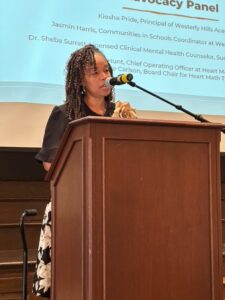 In March of 2023, the Session created an Affordable Housing Strategy Team with the goal of bringing a recommendation to help our church address one of our city’s most pressing needs—the lack of affordable housing in our city. Housing cost increases have outpaced growth in wages, so many people who are working full-time still struggle to afford a place to live. By city estimates, Charlotte is 32,000 units short in affordable housing. The same data show our city’s population growing by 100-120 new residents every day, adding to the demand, and putting pressure on the supply.
In March of 2023, the Session created an Affordable Housing Strategy Team with the goal of bringing a recommendation to help our church address one of our city’s most pressing needs—the lack of affordable housing in our city. Housing cost increases have outpaced growth in wages, so many people who are working full-time still struggle to afford a place to live. By city estimates, Charlotte is 32,000 units short in affordable housing. The same data show our city’s population growing by 100-120 new residents every day, adding to the demand, and putting pressure on the supply.
By definition, a housing unit is affordable when a household spends no more than 30% of its annual income on rent and utilities expenses. According to the National Housing Conference’s Paycheck to Paycheck model, a person needs to make $47,200/yr to afford a 1-bedroom apartment or $53,320/yr to afford a 2-bedroom apartment—IF one can even be found. Elementary school teachers in the Charlotte-Gastonia-Concord area make around $48,990 which just barely meets the 1-bedroom income minimum. Preschool teachers make around $29,760 which is nowhere near the minimum salary needed for affordable housing. And there is NO scenario where anyone in the teaching field makes enough to actually purchase a home.
North Carolina last revised its state minimum wage in 2008 (15 years ago) when it increased it 70 cents to $7.25/hr. According the CLT-MECK Housing & Homelessness 2022 Data Fact Sheet, if you make minimum wage, you would need to work 108 hours a week to afford a 1-bedroom unit at Fair Market Rent (or $1,014). For minimum wage earners, paying $377/month in rent is more realistic, yet according to rent.com, actual average rent in Charlotte is closer to $1,544 for a 1-bedroom.
The need in our community is immense and, since its formation, the Strategy Team has been working prayerfully and methodically to develop short, mid, and long-term strategies that align with First Presbyterian Church’s mission and our partners’ work to make an impact on the affordable housing crisis.
To gauge the congregation’s areas of interest in affordable housing, Liz Ward of Give Impact conducted five small group conversations. All church members were invited to participate. Strategy Team members were present at each gathering. A few messages came across loud and clear: continue our focus in the 28208 zip code (Westerly Hills and Lakeview); focus on workforce housing, specifically supporting teachers; continue to work with and support our existing partners; and collaborate with those who have been doing the work successfully. Following the small group conversations, the Team met with five of our top partners (Roof Above, Lakeview Neighborhood Alliance, Habitat, Westerly Hills Elementary, and Freedom Communities) to learn about their goals, successes, challenges, and needs. FPC can help our struggling neighbors have a safe, decent place to live so that they can live where they work, keep their children in a consistent school, and achieve their God-given potential.
 During one of these meetings, Kiesha Pride, principal of Westerly Hills Elementary shared some stories of staff and families that are feeling the impact:
During one of these meetings, Kiesha Pride, principal of Westerly Hills Elementary shared some stories of staff and families that are feeling the impact:
It is no secret that teacher pay continues to lag behind other professions and it has yet to catch up with the rising cost of housing/living. As an administrator, I have experienced the direct impact of the staff’s inability to remain in both Mecklenburg county and the state of North Carolina due to pay and the lack of affordable housing. We have lost several teachers who had to move back home (out of state) because the cost of living was too high to continue to live and work in the city. Within the last 3 years, I have lost 3 staff members because they had to relocate back with their parents/families as a direct impact of the financial burden that high rental rates placed upon them. Most recently at Westerly Hills, a staff member had to relocate back to Georgia because she lost her husband and was faced with the challenge of providing for her family and needing support from her extended family. At least 85% of my staff MUST work second jobs to “make ends meet” as they often share such concerns with me. I have had many conversations with them as they share, they are working 7 days per week and late nights in order to keep up with monthly financial obligation (housing being a major part of that). I have also had several teachers who moved to neighboring counties for lower rental and mortgage rates. While they attempted to remain employed with the district, the commute was not sustainable due to increased gas prices that balanced out the salaries between the two counties.
 Affordable housing (or lack thereof) is also a major challenge for the families we serve at Westerly Hills Academy. We have many families who are “doubled” up in order to maintain housing. Our population is very transient as families come and go due to eviction and the parents’ inability to maintain consistent housing due to the ever-increasing rental rates. To date, we have several families who are considered McKinney Vento (homeless/without stable housing) as a result. We serve several families who live in motels. Recently, my social worker and I were on the phone late one Friday evening to ensure that one of our families had housing (in a motel) for the weekend.
Affordable housing (or lack thereof) is also a major challenge for the families we serve at Westerly Hills Academy. We have many families who are “doubled” up in order to maintain housing. Our population is very transient as families come and go due to eviction and the parents’ inability to maintain consistent housing due to the ever-increasing rental rates. To date, we have several families who are considered McKinney Vento (homeless/without stable housing) as a result. We serve several families who live in motels. Recently, my social worker and I were on the phone late one Friday evening to ensure that one of our families had housing (in a motel) for the weekend.
When people leave our community because of the lack of affordable housing or live an hour away because they cannot afford to live closer, it puts a stress on our workforce and everyone’s quality of life suffers. Because our church exists “to reflect the love of Christ from the heart of Charlotte” and Christ calls us to love our neighbors, our city’s problem is our problem.
Want to learn more? Visit our webpage: firstpres-charlotte.org/advocacy/homelessness.
.
